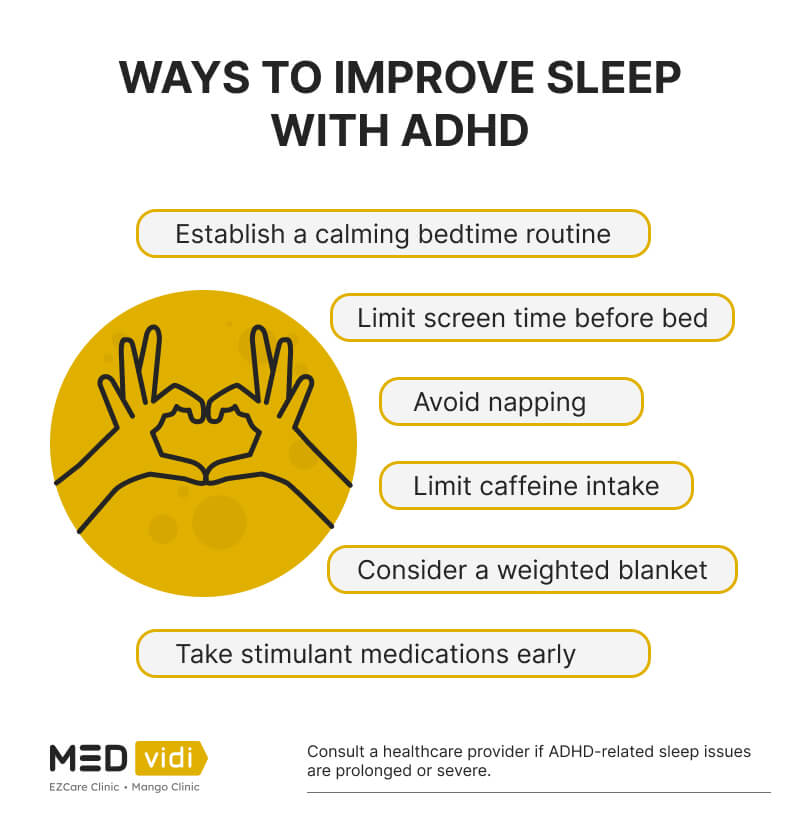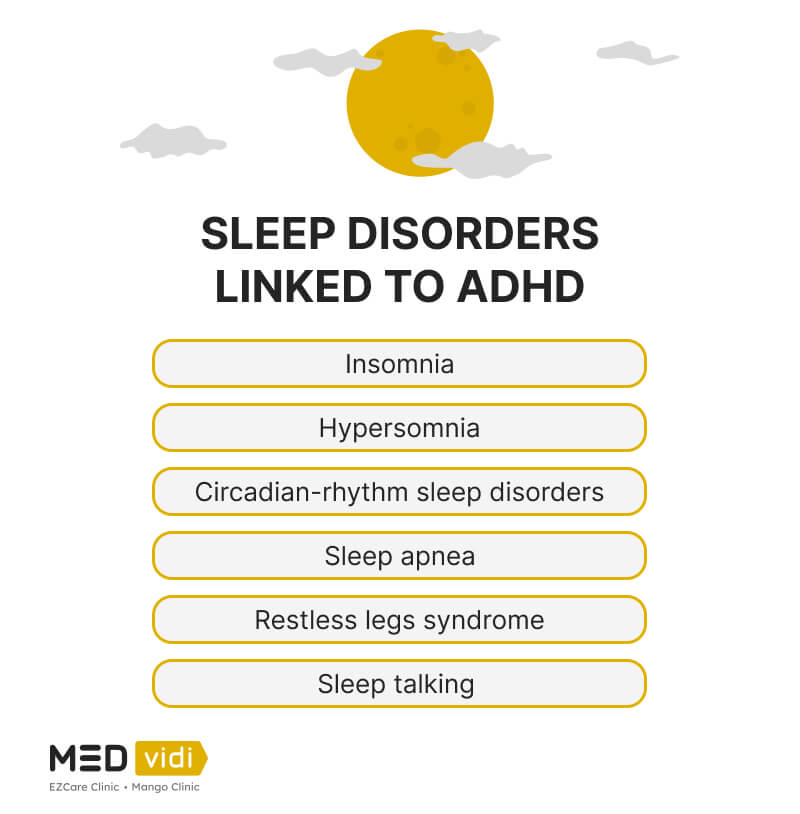People used to think that ADHD was only a problem for kids. But now, we know that it can continue into adulthood. In fact,
Book your appointment with MEDvidi providers today and add sleep to sleepless nights.
How are ADHD and Insomnia Connected?
It is established that up to
For instance, the dysregulation of dopamine, a neurotransmitter key in regulating sleep-wake cycles and attention, is implicated in both ADHD and insomnia. ADHD symptoms may also lead to difficulty in settling down for sleep due to restlessness or hyperactive thoughts, contributing to the onset of insomnia. Conversely, insomnia can exacerbate ADHD symptoms by impairing cognitive functions like attention and impulse control.
Do You Have ADHD or a Sleep Disorder?
There are clear similarities in the symptoms of ADHD and sleep disorders. For example, difficulties in concentration, fatigue, and mood disturbances. This overlap can complicate the diagnostic process. A critical distinguishing factor, however, is the context in which these symptoms occur. In ADHD, symptoms like inattentiveness or restlessness are chronic and pervasive, impacting various areas of life regardless of sleep quality. In sleep disorders, cognitive and mood symptoms are primarily linked to poor sleep and improve when sleep quality or quantity is restored.
Moreover, although both ADD and sleep disorders can disrupt sleep, the underlying causes differ. In ADHD, the restlessness or racing thoughts associated with the condition can make it hard to relax and fall asleep. Sleep disorders, on the other hand, are typically rooted in physiological abnormalities, like issues with the sleep-wake cycle, breathing problems, or restless legs syndrome.
When trying to determine if you have ADHD, a sleep disorder, or both, you can start with an online ADHD test, but it cannot replace a consultation with a healthcare professional. A thorough evaluation involves gathering a detailed medical, psychological, and sleep history. It can be supplemented by neuropsychological testing or a sleep study. Understanding your symptoms in-depth can guide personalized treatment strategies, whether they involve behavioral interventions, medication, or a combination of both.
How Do ADHD Sleep Problems Affect Daily Life?
ADHD-related sleep problems significantly affect daily life, with persistent sleep deprivation exacerbating symptoms like inattention, impulsivity, and hyperactivity. These can result in struggles with concentration, organization, and task completion in everyday settings. Moreover, inadequate sleep can lead to emotional instability, causing mood swings, increased stress, and fatigue. Consequently, ADHD and sleep issues can greatly impact academic performance, work productivity, relationships, and overall well-being.
How Does ADHD Cause Insomnia?
Can ADHD cause insomnia? Yes, several interconnected factors contribute to the prevalence of insomnia in people with ADHD:
- Neurotransmitter dysregulation. Both ADHD and insomnia involve imbalances in certain neurotransmitters, particularly dopamine, which plays a key role in regulating attention, motivation, and the sleep-wake cycle. In ADHD, the imbalanced dopamine system can interfere with sleep regulation, contributing to insomnia.
- Restlessness and hyperactivity. The inherent restlessness and hyperactivity associated with ADHD can make it difficult for individuals to relax and prepare for sleep. Racing thoughts or an inability to stay still can delay the onset of sleep, leading to a pattern of delayed sleep phase.
- Poor sleep hygiene. Individuals with ADHD often struggle with time management and maintaining routines. This includes difficulties with sleep hygiene practices, such as keeping a regular sleep-wake schedule, avoiding stimulants like caffeine before bedtime, and creating a calm and quiet sleep environment.
- Medication side effects. Stimulant medications commonly used to treat ADHD can cause insomnia as a side effect. While beneficial for managing ADHD symptoms, these medications can increase arousal and potentially disrupt sleep.
- Bidirectional relationship. The relationship between ADD and insomnia can be a vicious cycle where insomnia exacerbates ADHD symptoms and vice versa. Sleep deprivation can impair cognitive functions like attention and impulse control, which in turn can worsen insomnia.
Worried about your sleep? Connect with our expert doctors who can help you uncover the causes and craft a personalized treatment plan.

Sleep Disorders Tied to ADHD
Sleep disturbances are increasingly recognized as a significant aspect of ADHD, often exacerbating the disorder’s symptoms and impacting overall quality of life. Let’s find out about some specific sleep issues tied to ADHD, including ADHD and nightmares, ADHD and lack of sleep, ADHD and sleep talking, sleeping too much, and ADHD falling asleep.
Insomnia
In addition to classic ADHD symptoms, temporal lobe ADD may include issues with learning and memory, behavioral problems, and aggressive behavior. These individuals may struggle with reading and following directions.
Temporal lobe ADD is not gender-specific or age-specific; it can affect both males and females across various age groups.
Hypersomnia
Sleeping too much, or hypersomnia, is another issue that can occur in individuals with ADHD. It might seem counterintuitive considering the frequent sleep disturbances associated with ADHD, but some individuals may experience prolonged sleep periods or excessive daytime sleepiness. This could be due to the poor quality of sleep often experienced by individuals with ADHD, resulting in chronic fatigue. Certain medications used to manage ADHD can also lead to oversleeping.
Circadian-rhythm Sleep Disorders
Individuals with ADHD often have a disrupted circadian rhythm, leading to disorders like delayed sleep phase syndrome (DSPS). This condition manifests as a chronic pattern of late sleep onset and late awakening times. This pattern may contribute to either ADHD-related sleep deprivation or to the common issue of ADHD oversleeping. Excessive sleep can interfere with daily routines and exacerbate ADHD symptoms.
Sleep Apnea
Sleep apnea is another condition linked to ADHD. Its common risk factors include obesity, large tonsils, and endocrine disorders. Sleep apnea is defined by repeated pauses in breathing during sleep, and these interruptions result in fragmented sleep and daytime fatigue. These, in turn, further affect attention span and increase hyperactivity. If you are concerned about sleep apnea, consider reaching out to your healthcare provider because it can be interconnected with other conditions, such as
Restless Legs Syndrome (RLS)
RLS is a neurological condition causing unpleasant leg sensations and an irresistible urge to move them. This can disrupt sleep and is more common among people with ADHD than in the general population.
Sleep-disordered Breathing
Apart from sleep apnea, other forms of sleep-disordered breathing, such as hypoventilation, can occur in individuals with ADHD. These conditions cause poor sleep quality and exacerbate daytime ADHD symptoms.
Narcolepsy
While less common, narcolepsy, characterized by excessive daytime sleepiness and sudden bouts of sleep, can be associated with ADHD. It is thought that the common denominator is a dysregulation of neurotransmitters like dopamine, which play a critical role in both disorders.
Get in touch with our healthcare providers and learn more about how to overcome your sleep problems.

Sleep Talking
Sleep talking, or somniloquy, is a sleep disorder that entails talking during sleep without the individual being aware of it. While sleep talking can occur in anyone,
Nightmares
Nightmares, defined as vividly disturbing dreams usually causing the individual to awaken, have been
How to Cope With Insomnia if You Have ADHD?
There are many strategies you can employ to improve the quality of your sleep. Here’s how to cope with insomnia when you have ADHD:
- Be wary of ADHD and naps in adults. Avoid napping, especially four hours before bedtime. While naps can be a refreshing pick-me-up for some people, ADHD and naps are incompatible as naps can disrupt your sleep cycle and make it even harder to fall asleep at night.
- Limit caffeine intake. Caffeine is a stimulant, which can make it hard to sleep. To prevent this, avoid consuming caffeinated beverages and foods in the hours leading up to bedtime.
- Mind your medication timing. If you are taking stimulant medication for your ADHD, it is important to take it as early as possible in the day. These medications can make it harder to fall asleep, so working with your doctor to find the optimal timing can greatly benefit your sleep.
- Establish a calming bedtime routine. A calming bedtime routine can signal to your body that it is time to wind down and prepare for sleep. This could include activities like reading a book, listening to calming music, or practicing mindfulness or relaxation exercises.
- Keep a consistent sleep schedule. Try to go to bed and wake up at the same time every day, even on weekends. Maintaining a consistent sleep schedule can help regulate your body’s internal clock and make it easier to fall asleep and wake up.
- Create a comfortable sleep environment. Your sleep environment plays a crucial role in how well you sleep. Aim to sleep in a comfortable bed and in a room that’s dark, quiet, and cool. You might consider using earplugs, an eye mask, or a white noise machine if needed.
- Limit screen time before bed. The light emitted by screens and electronic media can interfere with your body’s production of melatonin, a hormone that regulates sleep. Avoid screens in the hours leading up to bedtime to help your body prepare for sleep.
- Exercise and sunlight. Regular physical activity and exposure to sunlight during the day can help regulate your sleep-wake cycle. Exercise can promote better sleep by reducing anxiety and depressive symptoms. Meanwhile, exposure to natural light during the day helps maintain a healthy sleep-wake cycle.
- Consider a weighted blanket. Some people with ADHD find that using a weighted blanket helps them sleep better. The gentle, constant pressure that these blankets provide can have a calming effect, making it easier to fall asleep.
Bottom Line
ADHD and its associated sleep disorders, such as insomnia, are multifaceted conditions that require personalized treatment approaches. The symptoms, impacts, and appropriate coping strategies can vary greatly from one individual to another. Just as a medication like Adderall must be tailored to the unique needs of each patient, so too must strategies for managing sleep problems in individuals with ADHD.
MEDvidi provides all-encompassing care for adults dealing with ADHD and its related sleep disorders. Recognizing how these conditions affect your daily life and identifying the symptoms that need urgent attention are the initial steps toward choosing an effective treatment plan. Our proficient medical staff can provide a diagnosis and deliver holistic care, including prescriptions for stimulant or non-stimulant medications, as well as guidance on sleep hygiene and lifestyle modifications to enhance sleep quality and your overall well-being.
FAQ
What is ADHD task paralysis?
Do people with ADHD need less sleep?
Does caffeine help ADHD?
Why is it so hard to wake up with ADHD?
Does ADHD cause a delayed sleep phase?
Why do ADHD people struggle to sleep?
They may have a delayed sleep-phase disorder, causing them to naturally fall asleep and wake up later. Additionally, common ADHD symptoms like restlessness and hyperactivity can make it difficult to relax and fall asleep. Finally, some medications used to manage ADHD symptoms can also contribute to sleep problems.













